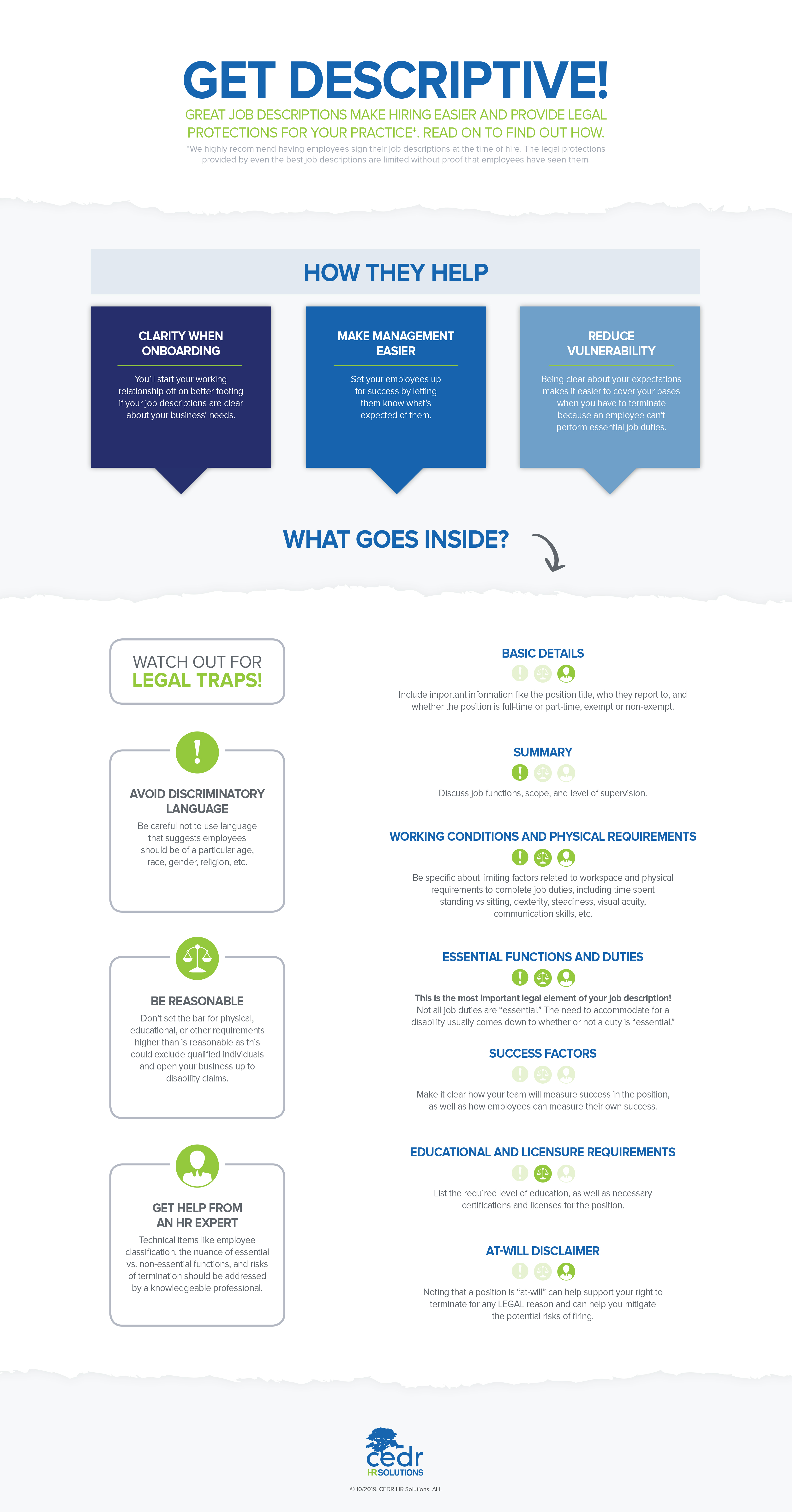|
Date |
ArticleType |
|
10/15/2019 |
Insights |
Behold the Power of Great Job Descriptions |
|
|

Behold the Power of Great Job Descriptions!
Get this: according to a "Talent Advisory Industry Benchmark Study" conducted by Allegis Group, 72 percent of hiring managers say they provide employees with clear job descriptions, though only 36 percent of candidates agree. If you’re like most office managers, updating the job descriptions for all positions at your practice is probably somewhere between scrubbing the grout between floor tiles with a toothbrush and personally testing all available flavors of fluoride rinse, in terms of priority.
And it makes sense. After all, once you’ve hired someone for a position they should have a good idea of what is expected of them, right? And, when it comes down to it, isn’t that all a job description does?
Not so fast.
Job descriptions actually do quite a bit more than just explain what employees should expect to do while at work. Quality, legally compliant job descriptions serve a number of purposes, including making expectations abundantly clear for your employees, helping managers to manage, and providing legal protections for your practice. Further, poorly written job descriptions can actually leave gaping holes in your practice’s legal armor.
Here’s a rundown of what a high-quality job description can do for your practice:
They Provide Clarity When Hiring
Naturally, job descriptions are an important component of the hiring process. After all, how can you know when you’ve found the right candidate if you don’t know exactly what that candidate will be doing for your practice?
Your job descriptions should be clear about the role each position plays at your practice. They should explain the duties performed by the employees in that position, outline the physical and educational requirements for completing those duties with or without a reasonable accommodation, and they should set expectations for measuring performance.
In fact, your job ads should actually be built directly from the template of your job descriptions to ensure that you’re attracting the candidates that are best suited to work at your business.
They Make Management Easier
Think of your job descriptions as a roadmap to success for each employee you bring on board.
As an employee progresses, having a job description that clearly outlines their duties and the expectations you have for them makes it easier to evaluate performance, determine areas of particular strength, and identify where there is room to improve.
Your job descriptions are the best way to communicate expectations for each position at your practice. After all, you can’t expect an employee to know that they are supposed to fill a particular role or complete a specific duty if it isn’t included in that document.
It’s a good idea to have your employees sign their job descriptions when hired to acknowledge they understand what is expected of them from day one.
They Reduce Your Level of Vulnerability When Things Go Wrong
If you find that an employee isn’t working out for whatever reason, a good job description can be a powerful ally.
You can use job descriptions to pinpoint exactly how an employee is falling short of expectations or failing to execute duties. They can also help when one of the most sensitive management situations you can face arises -- when an employee becomes disabled or otherwise physically incapable of performing the job you hired them to do, even with a reasonable accommodation.
Such situations need to be handled cautiously and compassionately. But, as an office manager, your work requires you to take action when someone’s performance is negatively affecting the overall operation of the practice.
HR rule #1 is to always make an effort to accommodate an employee in such a situation, if at all possible. But, if a dental hygienist starts having issues with trembling hands, for example, there may not be much you can do to accommodate that employee. And having “steady hands” listed as a qualification of employment can help you support a case for termination if it comes to it, and to avoid a claim of disability discrimination if one should come up later.
For more insight about how to write more effective, legally compliant job descriptions, refer to the infographic below.
Then, click HERE to download the following Free job description templates for two popular positions at your practice -- dental assistants and front desk positions -- and skip the struggle of writing them yourself!

|
|
|